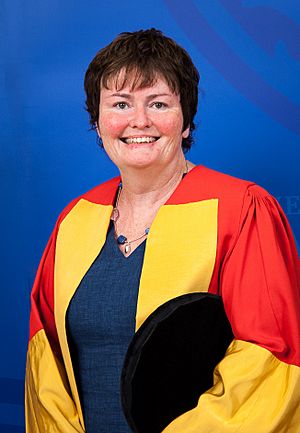Fiona Powrie facts for kids
Quick facts for kids
Dame Fiona Margaret Powrie
|
|
|---|---|
 |
|
| Born | 1963 (age 61–62) Luton, England
|
| Alma mater |
|
| Known for | Work on Regulatory T Cells |
| Awards |
|
| Academic career | |
| Institutions |
|
| Thesis | Functional analysis of rat T cell subsets |
| Doctoral advisor | Don Mason |
| Academic advisor | Robert L. Coffman |
Dame Fiona Margaret Powrie DBE FRS FMedSci is a leading scientist from England. She was born in 1963. She is well-known for her important work on the immune system. Specifically, she studies special cells called Regulatory T Cells. These cells help control how our body fights off sickness.
Currently, she leads the Kennedy Institute of Rheumatology at the University of Oxford. This is a big research center. She also heads the Experimental Medicine Division there.
Contents
Her Journey in Science
Fiona Powrie started her science journey by studying biochemistry. She went to the University of Bath. After that, she earned her PhD degree. She did this at the University of Oxford in Don Mason's lab. A PhD is a high-level university degree. It shows someone is an expert in their field.
Important Discoveries
Understanding Regulatory T Cells
Fiona Powrie worked with Don Mason. They studied different types of T cells in rats. T cells are a type of white blood cell. They are a key part of our immune system.
Their research showed that some T cells could cause problems. But other T cells could stop these problems. These "stopping" cells were later called regulatory T cells (Tregs). This early work was very important. It helped scientists understand how Tregs keep our immune system balanced.
Studying Gut Inflammation
After her PhD, Dr. Powrie continued her research in California. She worked with Robert L. Coffman. There, she developed a special way to study gut inflammation. This is when the intestines get swollen and sore. It's like when you get a cut, but inside your body.
She found that certain T cells could cause severe gut inflammation in mice. But other T cells could prevent it. This helped her learn more about diseases like inflammatory bowel disease. She also found that certain chemicals in the body, like IL-10, could help. Her work showed how important Tregs are in keeping the gut healthy.
When she returned to the University of Oxford in 1996, she kept studying Tregs. Her lab found out how these cells stop inflammation. They also discovered that a molecule called IL-23 plays a big role in causing gut problems.
Tregs as a Treatment
Dr. Powrie's team also made another exciting discovery. They found that Tregs could not only prevent inflammation. They could also help cure existing inflammation. This means Tregs might be used as a treatment in the future.
She was also one of the first to find Tregs in human blood. This confirmed that these special cells exist in people too. This was a big step forward for human medicine.
Awards and Recognitions
In 2009, Fiona Powrie became the first Sidney Truelove Professor of Gastroenterology at Oxford. This was a special honor.
In 2011, she was chosen as a Fellow of the Royal Society. This is a very old and respected group of scientists. In 2012, she received the Louis-Jeantet Prize for Medicine. This is a major award for medical research.
In 2022, she was given the title of Dame Commander of the Order of the British Empire (DBE). This is a high honor from the British Queen. She received it for her great contributions to medical science.
 | William Lucy |
 | Charles Hayes |
 | Cleveland Robinson |

